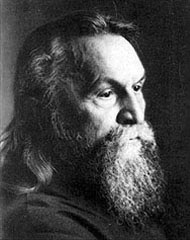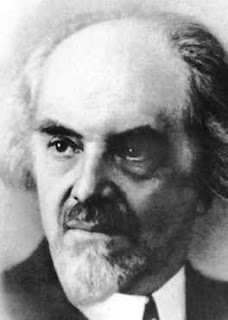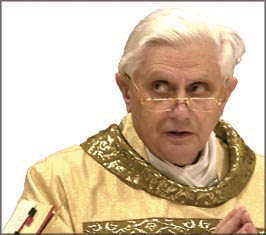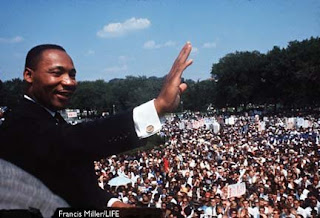Part 1: Nonviolence vs. The Just-War
Part 2: Justice vs. Mercy
Part 3: The War of Mercy
(Disclaimer: I hope that this discussion can lead all of us to a closer look at Church teachings, and so I have tried to keep my thoughts focused upon the Magisterium’s teachings. It’s my hope that any discussion provoked by this post will maintain the same mindset. Though we can find truth in many places, why not go to its source – Christ and his Church? I’ve avoided scripture because as Catholics, our understanding of scripture should first be firmly grounded within Catholic thought. I’ve avoided specific situations of pacifism because they focus on application before understanding. And finally, I’ve avoided judgmental talk of good and evil, of sins and saints. I’m not out to condemn anyone. I’m out to discover truth.)
Recap of Militant, Parts 1 & 2:
Part 1 concluded that the Church is absolutely clear about the duty of self-defense, but equally clear that love is the only solution to evil. In the end, the mercy of nonviolence and the justice of war were held in tension.
“The pillars of true peace are justice and that form of love which is forgiveness .”
– Pope JPII (2005 Peace Message)
Part 2 explored the relationship between justice and mercy, and found that justice can only be established through mercy.
“Mercy is in a certain sense contrasted with God’s justice, and in many cases is shown to be not only more powerful than that justice but also more profound. Even the Old Testament teaches that, although justice is an authentic virtue in man, and in God signifies transcendent perfection nevertheless love is “greater” than justice: greater in the sense that it is primary and fundamental. Love, so to speak, conditions justice and, in the final analysis, justice serves love. The primacy and superiority of love vis-a-vis justice – this is a mark of the whole of revelation – are revealed precisely through mercy.”
– Pope JPII (1980 Encyclical Dives in misericordia)
Part 3 has taken weeks to write, because I’ve found my heart moving on this subject. After having read encyclical after encyclical, after having looked at the Church’s teachings in a depth that I never have, I’ve come to a startling conclusion.
I’ve been wrong.
I am no longer a pacifist.
I’ve always hated that label – ‘pacifist’. I’m glad to see it go. So what am I? A Catholic, sure. But what else? I am, strangely enough, exactly what my father predicted I would become – a person who has renounced violence yet recognizes the legitimate use of force – both individual and societal force – in combating injustice within our world.
The Way of Violence
“The way of violence cannot obtain true justice.”
– Pope JPII (1987 Peace Message)
On June 6th, 1944, D-Day, countless men lost their lives on the beaches of Normandy. I find it hard to accept their deaths as anything but folly. I certainly honor every soldier’s courage and heart in facing death with the intention of defending the common good. I can understand and appreciate those who join the military with the intention of serving peace. That is what I did. It is what my father did. It is what my little brother is doing.
But understanding isn’t the same as endorsing. Honoring an intention isn’t the same as condoning an action. Just as the ignorant soldiers of Stalin, Mao, and Hitler can be honored for their dutiful yet misguided hearts, so too can those same soldiers be admonished for their lack of faith – their refusal to follow the lead of our Church’s newest martyr, Franz Jägerstätter, who wrote:
“As a Christian, I prefer to do my fighting with the Word of God and not with arms,” he wrote. “We need no rifles or pistols for our battle, but instead spiritual weapons — and the foremost among these is prayer.”
These are the words of a martyr. Those who lack faith in spiritual weapons of mercy must first face down the witness of the martyrs!
We who were filled with war and mutual slaughter and every wickedness have each of us in all the world changed our weapons of war … swords into plows and spears into pruning hooks.” (Trypho 110) “We who formerly murdered one another now not only do not make war upon our enemies but, that we may not lie or deceive our judges, we gladly die confessing Christ. (I Apol. 39)
– St. Justin Martyr
The Folly of Violence
Those who died on the beaches of Normandy died in futility, fighting for justice with all the wrong weapons – weapons in opposition to the prayers of their heart. While a forceful defense against Nazi Germany was warranted, while aggressive action was needed to restore justice to a conquered continent, while the conditions of the just-war theory were clearly met, and while justice required the use of force to combat the Nazis, justice did not demand machine guns, bombers, tanks, killing, and violence. Justice did not and does not demand death. Justice does not demand violence. Rather, justice demands mercy. The true weapons of justice, of the just-war, are forgiveness, prayer, love, and mercy.
“Justice makes whole, it does not destroy; it leads to reconciliation, not to revenge.“
– Pope JPII (1998 Peace Message)
It isn’t difficult to highlight the folly of violence as a means of restoring justice.
“The way of violence cannot obtain true justice.”
– Pope JPII (1987 Peace Message)
Pope JPII refers specifically to terrorist violence in this Peace Message, yet his teaching remains valid for ‘the way of violence’ – the belief that violence can truly obtain justice. ‘The way of violence’ trusts in violent force as a means of fighting injustice. ‘The way of violence’ does not trust in merciful force as a means of fighting injustice. It does not trust in forgiveness. It does not trust in self-sacrifice. It only trusts in other-sacrifice.
As an Army veteran and former Ranger, I was indoctrinated in the way of violence. I was taught to have faith in violent force. Every time I hear or read a soldier’s story, I see the same thing, I see myself 4 years ago, drowning in the same futile faith:
Here is your situation Marine:
You just took fire from unlawful combatants (no uniform – breaking every Geneva Convention rule there is) shooting from a religious building attempting to use the sanctuary status of their position as protection.
But you’re in Fallujah now, and the Marine Corps has decided that they’re not playing that game this time. That was Najaf. So you set the mosque on fire and you hose down the terrorists with small arms, launch some AT-4s (Rockets), some 40MM grenades into the building and things quiet down. So you run over there, and find some tangos (bad guys) wounded and pretending to be dead. You are aware that suicide martyrdom is like really popular with these idiots, and they think taking some Marines with them would be really cool. So you can either risk your life and your fire team’s lives by having them cover you while you bend down and search a guy that you think is pretending to be dead for some reason. Most of the time these are the guys with the grenade or vest made of explosives. Also, you don’t know who or what is in the next room. You’re already speaking English to the rest of your fire team or squad which lets the terrorist know you are there and you are his enemy.
You are speaking loud because your hearing is poor from shooting people for several days. So you know that there are many other rooms to enter, and that if anyone is still alive in those rooms, they know that Americans are in the mosque. Meanwhile (3 seconds later), you still have this terrorist (that was just shooting at you from a mosque) playing possum. What do you do? You double tap his head, and you go to the next room, that’s what!!! What about the Geneva Convention and all that Law of Land Warfare stuff? What about it.
Without even addressing the issues at hand, your first thought should be, “I’d rather be judged by 12 than carried by 6.” Bear in mind that this tactic of double tapping a fallen terrorist is a perpetual mindset that is reinforced by experience on a minute by minute basis . . . there is no compelling reason for you to do anything but double tap this idiot and get on with the mission.
If you are a veteran, then everything I have just written is self evident. If you are not a veteran, then at least try to put yourself in the situation. Remember, in Fallujah there is no yesterday, there is no tomorrow, there is only now. Right NOW. Have you ever lived in NOW for a week? It is really, really not easy. If you have never lived in NOW for longer than it takes to finish the big roller coaster at Six Flags, then shut your hole about putting Marines in jail for “War Crimes”.
The ‘way of violence’ makes sense in a world without Christ crucified and risen. Soldiers are taught how to kill, they are taught that killing makes sense, they are taught that killing works. We’ve all been taught that killing works. But it doesn’t. ‘The way of violence’ doesn’t forge justice, it doesn’t forge peace. The way of violence is folly.
“Violence is a lie . . . violence destroys what it claims to defend: the dignity, the life, the freedom of human beings.”
– Pope John Paul II (Address at Drogheda, Ireland 1979)
A History of Folly
Throughout history, our Church has demanded that men and nations turn away from the way of violence, and pursue another path – a path of mercy:
We implore those in whose hands are placed the fortunes of nations to hearken to Our voice. Surely there are other ways and means whereby violated rights can be rectified. Let them be tried honestly and with good will, and let arms meanwhile be laid aside . . . Let them not allow these words of a friend and of a father to be uttered in vain.
– Pope Benedict XV (1914 Encyclical Ad Beatissimi Apostolorum)
In 1914, at the beginning of WWI, our Pope asked men to try another way to restore justice. But they had more faith in ‘the way of violence’ than the way of mercy. ‘The way of violence’ did eventually work to end the killing, but it did not work to end the injustice – an injustice which led straight to WWII.
“The Great War . . . did not serve to lessen but increased, by its acts of violence and of bloodshed, the international and social animosities which already existed . . . Peace indeed was signed in solemn conclave between the belligerents of the late War. This peace, however, was only written into treaties. It was not received into the hearts of men, who still cherish the desire to fight one another”
– Pope Pius XI (1922 Encyclical Ubi Arcano Dei Consilio)
Justice, even international justice between warring states, cannot be achieved aside from the Gospel force of merciful love!
“Thank God, one may believe the time has passed when the call to moral and Gospel principles to guide the life of states and peoples was disdainfully thrust aside as unreal. The events of these war years have given ample evidence to confute, in a harder way than one could ever have imagined, those who spread such doctrine. The disdain that they affected towards this supposed unreality has been changed into stark reality: brutality, iniquity, destruction, annihilation.”
– Pope Pius XII (1944 Christmas Message)
Sadly, men and women continue to thrust aside the Gospel as the solution to peace within and among nations. They lock the Gospel into a box that says, “Do not open until the Parousia,” and outside of that box, in a world without the Gospel of Love, merciless injustice reigns:
Let all of them remember what war brings in its wake, as we know only too well from experience—nothing but ruin, death and every sort of misery . . . there have never been lacking, either in ancient or in more recent times, those who tried to subjugate the peoples by the use of arms; on the other hand, We have never ceased to promote a true peace. The Church desires to win over peoples and to educate them to virtue and right social living, not by means of arms but with the truth. For “the weapons of our warfare are not carnal, but mighty to God”
– Pope Pius XII (1950 Encyclical Summi Maeroris)
The Weapons of Mercy
The weapons of Christian warfare are not bombers and bullets. In ignorance, we have been waging just-wars with unjust weapons. We have been warring for justice with weapons that betray justice. And the injustices of war will continue until we pick up the weapons of mercy.
The Magisterium condemns “the savagery of war” and asks that war be considered in a new way. – CSDC 497
While some Americans seem to dismiss anything our Bishops have to say about violence, the successors of the Apostles have demanded that war be reconsidered. This doesn’t mean that the Church is asking us to lay down on our bellies and let terrorists kill our loved ones. Rather, we are being asked to tackle the ‘savagery of war’, and in this light, to reconsider war – to reconsider the savage weapons of war. The Church has a history of questioning not so much our right to self-defense, but the weapons we use in such self-defense.
We prohibit under anathema that murderous art of crossbowmen and archers, which is hateful to God
– Lateran Council II : 1139 A.D.
The Church has never ceased to fight against the injustices of the just-war. While always recognizing the right to self-defense, the Church has adamantly opposed methods of defense that violate the foundations of mercy and the pursuit of justice – from torture to crossbows, from nuclear weapons to crucifixion. On the positive side, our Magisterium has also proposed for us the supreme weapon of mercy – nonviolence.
“We have need of the God who overcomes on the cross, who does not conquer with violence, but with his love . . . through the nonviolence of his cross . . . (it) is a way of conquering that seems very slow to us, but it is the true way of overcoming evil, of overcoming violence, and we must trust this divine way of overcoming.”
– Pope Benedict XVI (26July2006 Zenit)
Nonviolent Force
Nonviolent force is the only force that has a chance of restoring justice, because it is the only force founded upon mercy – the only force unwilling to harm or kill. While those who use violent force are prepared to sacrifice their enemy, those who use nonviolent force are prepared to sacrifice themselves. Yet both seek the same goal:
The defense of the common good requires that an unjust aggressor be rendered unable to cause harm.
– CCC 2265
The only difference between nonviolent force and violent force is who we are willing to sacrifice – ourselves or our enemies. In each case, the use of force has dangers. The use of force is never guaranteed to achieve what we set out to achieve. The use of force often fails. But there is a question of hope. Violent force has no hope of restoring justice. Nonviolent force, being founded upon merciful love of enemy – a love willing to go to death for the enemy – such force is the only weapon capable of restoring justice to a splintered world.
Nonviolent Weapons
Only under the most strict conditions can the following weapons ever be considered for use against an aggressor – conditions detailed by the just-war theory. Otherwise, nonviolent force would become simply another means of domination. Nonviolent force ought only to be used as a last resort, in response to a violation of justice that is lasting, grave, and certain. But if those conditions (among others) are met, then we must respond. We must protect ourselves with force.
This is a major change of heart for me. It leads me down strange paths that are unfamiliar – paths that have barely been explored. But they must be! In a world that adores violence, how are Christians to forcefully defend themselves with nonviolence?
Why not go to those who are experts in force, to the military? For those who doubt that nonviolent force could be used effectively to defend ourselves, take a close look at why the military would expend so much time and effort researching the following nonviolent weapons:
1) The Stink Bomb
“GOTTA get out of here. Heart’s pounding. Can’t think. Can’t speak. Daren’t breathe. Just run . . . They don’t know what the evil-smelling odour is but their noses tell them it’s dangerous, and within seconds their stomachs sound the general alarm. In two minutes the streets are empty. All that’s left is a terrible stink.
This hasn’t happened yet, but it could if the US Army succeeds in its effort to create the mother of all stink bombs . . . The search for the perfect stink bomb is part of the Pentagon’s Nonlethal Weapons Program . . . It could also help peacekeeping forces keep warring factions apart by creating stench-filled exclusion zones . . . ideal for ending a siege without firing a shot, or for dispersing rioters or even marking the ringleaders so they can’t escape into the crowd.” (New Scientist)
2) Liquid Ball Bearings
Sometimes keeping an enemy down but not out is good enough. The Southwest Research Institute in Texas has created a sprayable antitraction gel for the Marines that is so slippery it is impossible to drive or even walk on it; one researcher describes it as “liquid ball bearings.” Spray the stuff on a door handle, and it becomes too slippery to turn. The antitraction gel is mostly water, so it dries up in about 12 hours. It is also nontoxic and biodegradable. (Time)
3) Sticky Foam
an incapacitant . . . consisting of various extremely tacky and/or tenacious materials carried in compressed form with a propellant and used to block, entangle, and impair individuals (wikipedia). . . some facilities storing uranium and plutonium now boast steel doors with containers of hydrocarbon solution built into them. Breach the door, and the liquid comes foaming out under high pressure, expanding in bulk by a factor of forty and sealing the breach with an impassable obstacle. (DefenseTech)
4) Dazzlers
The Veiling Glare Laser . . . obscures a wide field of view by creating a dazzling wall of light that swamps your vision. It is rather like looking through a dusty windscreen illuminated by bright sunlight . . . (it) exploits a rather unsettling phenomenon called lens fluorescence. The lens of the human eye is transparent to visible light, but certain violet or ultraviolet wavelengths can make it fluoresce, or glow. When your lens fluoresces, all you can see is glare. (New Scientist, LaserDazzler.net)
As an absolute pacifist, I didn’t have to think much. Now, I have to discern when force is appropriate, when it is not. I have to discern what is harmful to a person and what is not (the different between a restraint hold and a taser gun). But in the end, the law of love always holds true. I must always fight for justice with nonviolent and sacrificial love!
The War of Mercy
No force, no matter how nonviolent, can ever hope to bring peace to the world. Peace is brought through love, and through love alone. What are we defending with nonviolent force? We are defending our right to love, to . . .
- To feed the hungry
- To give drink to the thirsty.
- To clothe the naked.
- To visit and ransom the captives.
- To shelter the homeless.
- To visit the sick.
- To bury the dead.
- To admonish sinners.
- To instruct the ignorant.
- To counsel the doubtful.
- To comfort the sorrowful.
- To bear wrongs patiently.
- To forgive all injuries.
- To pray for the living and the dead.
War truly is an expedient. But only if waged nonviolently. Only a nonviolent war can allow us to work mercy upon the world, and to see it united in peace and justice.
Christian nonviolence . . . does not consist in surrendering to evil — as claims a false interpretation of “turn the other cheek” (Luke 6:29) — but in responding to evil with good. (Romans 12:17-21), and thus breaking the chain of injustice.
– Pope Benedict XVI (Angelus 18FEB2007)“. . . the pity of Bilbo, may rule the fate of many – yours not the least.”
– Gandalf
I am no longer a pacifist. I am Catholic. I am . . .
Militant.































